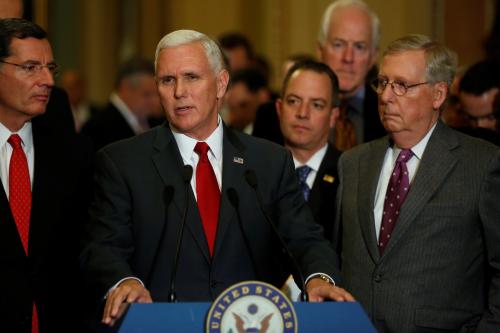Congressional Republicans’ last-ditch efforts at repealing the Affordable Care Act using the budget reconciliation process appear to have failed. The procedural protections that prevent a filibuster of the current bill expire on September 30, when the government’s new fiscal year begins. But is the option of party-line legislating on health care really off the table for good? It depends, in large part, on Republicans’ answers to the following three questions:
1. Can Republicans agree to a new budget resolution?
To use the fast-track reconciliation process in a given fiscal year, Congress must first adopt a budget resolution that contains reconciliation instructions, or language outlining which congressional committees will develop reconciliation legislation. When the 115th Congress began in January, the plan was to use the process twice: once for health care (with instructions initiated by the fiscal year 2017 budget resolution) and then a second time for tax legislation (with instructions contained in the fiscal year 2018 budget resolution).
With the FY2017 health care attempt now exhausted, Republicans could write FY2018 instructions that allow them to tackle both policy goals. On one hand, this would not be that difficult. Two committees that have substantial jurisdiction over health legislation—House Ways and Means and Senate Finance—also are responsible for taxes, so will already be included. Other health-related committees (House Energy and Commerce and Senate Health, Education, Labor and Pensions) could be given relatively small deficit reduction instructions to cover all necessary bases.
On the other hand, however, Republicans have struggled to come to agreement on what a budget resolution with reconciliation instructions for 2018 would look like—and that’s without introducing health care into the fight. One of the challenges in reaching agreement on a 2018 budget has been House conservatives’ insistence that they need more details on a tax bill before they support the budget resolution that will initiate said legislation. Senator Lindsey Graham (R-S.C.) threatened over the weekend that he “will not vote for a budget resolution that doesn’t allow the healthcare debate to continue.” While it would be relatively easy to meet that demand in principle, might other Republicans insist on more details or other promises related to health care in exchange for their support of the budget resolution? In the Senate especially, the GOP can spare relatively few votes and still adopt the resolution needed to kick off the reconciliation process.
2. Should health care and taxes be tackled separately or together?
Under current interpretations of the reconciliation procedures in the Senate, there are limits on the number of reconciliation bills Congress can consider each fiscal year. Reconciliation measures may make three kinds of budgetary changes: changes in revenue, changes in spending, and changes to the debt limit. If one bill contains more than one kind of change, that counts as the Senate’s attempt at both categories.
This year’s attempts at rolling back the Affordable Care Act have included both spending and revenue provisions. If Republicans want to pass health care changes that follow the same general outline from earlier this year—that is, eliminate the ACA’s taxes and pay for it with cuts on the spending side—they would have two choices. One, they could put all the spending AND revenue provisions from both their health care AND tax proposals together in one bill. Or, they could cleave the spending-side provisions off into a separate piece of legislation from the revenue items and attempt two different bills. The last two times Congress used the reconciliation process to make major changes in spending and taxes in the same year—1997 and 2005—it was by using this two separate measures approach.
The first option has a number of challenges (see #3 below), but so does the second. First, there are some aspects of the ACA that touch both revenue and spending, which could make it difficult to actually separate the two halves. Second, only about a quarter of currently serving House Republicans and roughly half of currently serving Senate Republicans were in Congress the last time their party attempted such a move, so many members lack experience with the process. A health care spending-only bill would still have to meet the various requirements of the reconciliation process, including those imposed by the Byrd Rule, and much of the Republicans’ intra-party disagreement so far has been over the spending-side substance of the measure. Republicans would also have to choose which bill to tackle first: the health care measure that has been front and center all year, or the tax legislation widely believed to just as important to key parts of the Republican base. If whatever they choose first takes up significant time, the calendar might prevent action on the second—especially in an election year.
3. If the answer is “together,” how do Republicans get to “yes”?
Suppose Republicans decide they are willing to try to tackle health care and taxes in the same, filibuster-proof legislation—and can adopt a budget resolution that allows them to do so. So far, writing a health care bill with majority support in the House and Senate has proved elusive. The path to tax legislation hasn’t been much smoother. And while there are some situations where logrolling across multiple hard issues actually generates a bill that’s easier to pass; as former Representative Barney Frank (D-Mass.) once said, “the key to understanding deal making Congress is to remember that the ankle bone is connected to the shoulder bone. Anything can be the basis of a deal.” But this year has presented little evidence to suggest that putting tax legislation and health care together in one measure would be one of those situations. Given how much time and energy Republicans have spent thus far with nothing to show for it on health care, many may be reluctant to tie the fate of a tax bill to an issue where victory has been so difficult.
The fate of the Affordable Care Act specifically does not, of course, rest just with Republicans’ immediate choices about reconciliation legislation in fiscal year 2018. The Department of Health and Human Services, for example, is taking actions that many see as undermining the implementation of the law—decisions the Department can make and pursue without any congressional action whatsoever. But on the legislative front, while party-line legislating to rollback Obamacare remains possible, the political path to success is likely to get harder, not easier, in the short term.










Commentary
What Republicans must answer about their next steps on health care
September 26, 2017